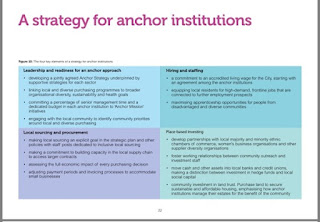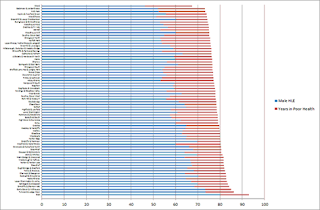The (false) trade off between the economy and health
A few months ago I had the privilege of delivering the @ScHARRSheffield 2021 Pemberton lecture
During the q&a at the end someone asked me to explain my
statement that the trade off between saving health and protecting the economy
was a false choice I gave a pretty poor answer Here I'll try set it out more
clearly
In "normal times" (remember them) I've been here quite a few times, most recently here
The onset of illness in working age is very common Multi
morbidity (more than one thing wrong with you) more common in poorer
populations & earlier onset, see Barnett 2012 also more
common numerically speaking in those of working age than those beyond
retirement age.
In Sheffield broadly the same holds true Those with lowest income spend more of their lives, often within working age, in less than good health. When considering Healthy Life Expectancy, in Sheffield, the healthiest areas for example Bents Green & Millhouses, a man could expect to live to 86 with 73 years in good health, or 13 years of poorer health. This equates to a seventh of that mans life in poor health.
In our least healthy areas for example Firth Park a man can
expect to live to about 73 of which 52 years will be in good health, or 21
years of poorer health. This equates to nearly a third of
that mans life in poor health.
The National data is here
If lots of folk unable to work or not at 100% because of
poor health that's 1) bad for them, 2) bad for families, 3) may lead to avoidable
poverty, may lead to 4) demand for the welfare system, and 5) demand for NHS
and social care. It is also 6) bad for economy (lost productivity on account of
poor health at earlier ages), Finally 7) it's also unfairly distributed- thus
an enormous social justice issue.
application of the false trade off in covid times
The CMO recently commented on the
trade off between covid and other health care "sometimes said by people
who have no understanding of health at all- and when they say it, usually
because they want to make a political point."
In short, if the urgent gets so overwhelming then there
becomes no option but to prioritize that in a fixed capacity machine Much
the same applies to other parts of society.
There are those who argue in favour of fewer or no restrictions in order to protect the economy. Taken to the edge this is the let it rip strategy, commonly known as the Great Barrington Declaration.
In that view there is a fundamental misunderstanding of 1)
how to control spread, 2) what will and wont make a difference and 3) the
consequences of the choices based on that misunderstanding.
If covid spread becomes so overwhelming the NHS becomes
overwhelmed and the government have no choice other than long lockdown to get R
below 0.
The HoC Library published on the Economics
of lockdowns 1) longer lockdowns risk doing more harm than good. 2) the
later we lockdown, the longer it will need to be to have the same effect
There are plenty in the business community who have told me
that the current space (they frame as lockdown lite - appeal to public
behaviour but no support to business for lost takings) doesnt seem essentially
supportive of the economy.
TDLR - there are two (often many more) sides to any discussion and the counterfactuals matter. Alot
So in summary
If your definition of "the economy" is the ONLY the
wealth creation function of the activity in the private sector then the trade
off is clearer to see.
If in the definition of "the economy" includes all benefits and all costs to the whole of society
over a long term time horizon are on the balance sheet - then its easy to see
how we get to the notion of the trade off between "health" and "economy" is a false choice or trade off.
Any which way round it seems that to say there is a trade
off sets up the perpetuation of false narrative.
All up, any which way round I'm struggling to see narrative
that what is before us is a choice between public health and the economy is in
any way a true choice It is put forward alot by right wing media, but it simply
perpetuates a false narrative.
A thread version is here






Comments
Post a Comment